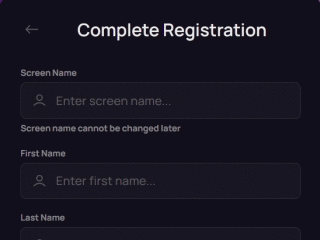The following text has been summarized from the original podcast audio.
– Welcome to the Grid podcast, where we feature one guest per hand in no-limit hold'em from AK to 72o. And today with us is my friend, Global Poker Award winner Xuan Liu. Her total tournament winnings exceed $2.4 million. These days, she mainly plays cash games and often appears on televised tables — including the one where today’s hand took place: at the WPT Championship at Wynn.
Xuan, can you set the scene for the hand you want to share with us? When did it happen, and what was your position at the time?
– It was Day 1 of 3. We were playing $100/$200/$400 squid. There was a lot of action. Everyone at the table knew what they were doing, but not all of them were pros. The buy-in for squid was either $500 or $1,000 — I don’t remember exactly. For those unfamiliar with the format: when a round starts, each player gets a token for winning a hand, and the last player left without one pays the full amount — $4,500 — to the others. This incentivizes more hands and looser preflop play. You can get away with playing pretty liberally with a short stack.
That said, in the hand I’m talking about, we were relatively deep. A very loose-aggressive, bluff-happy player named Peter straddled. I've played with him a lot, both on and off stream — we’re friends — and that definitely affected the dynamics.
– What's the difference between a squid game and a stand-up game?
– Generally, they’re interchangeable terms. In a stand-up game, people are technically supposed to stand, but in practice, they often don’t. Both formats penalize the last player to win a hand. I play a lot with Asian players, and they prefer to call it the squid game — as a nod to the TV series.
– You mentioned this was a "progressive squid." What does that mean?
– We tweak the rules depending on the lineup. In one version, the player who collects five tokens gets to take tokens from every other player. It’s a huge potential prize for the winner — and a disaster for everyone else.
– Would you recommend this format for low-stakes home games, just to mix things up?
– Oh yeah, definitely. I think it’s the future of poker. Many pros have studied charts and GTO so deeply that amateurs have no real shot against them. But when you introduce these variance-heavy rules, even the pros don’t have a roadmap — and that levels the field. It gives amateurs the chance to play more hands without punishment, and that makes the game a lot more fun.
In this hand, I didn’t have a token yet and I was in the small blind with K7 of Clubs. Peter straddled, everyone folded to the button, and the button raised. As you know, the solver loves this hand and often includes it in an expanded 3-bet range. But because I was one of the last players without a token, I expected to face a 4-bet more often — they want to pressure me. Plus, there were still two players left to act behind me. So it seemed better to just call and try to hit the flop.
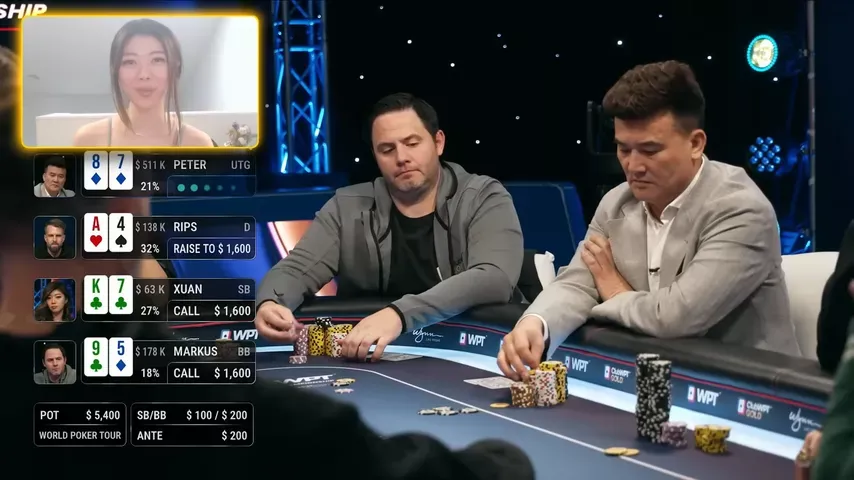
I called, BB called, and Peter 3-bet big. Effective stack was $64,000. Button folded, I called to see the flop. SPR at this point was about 3. BB folded.
Flop – . This was the dream: straight draw, flush draw, and enough depth to play for stacks. But out of position, we always start with a check and then react based on sizing.
Peter bet $7,000 into $18,000. Shove is an option here, but I doubted he’d fold anything with a pair. I don’t mind gambling with him in this spot, but I chose to call and keep in his weaker hands. Against someone who c-bets too wide, I think that’s reasonable.
The turn pot was $32,000 with an effective $50,000 behind. Turn was a 10, a blank in this situation. Interesting card. I checked. Peter should lean toward checking back or going small here. But he bet $17,000 — a big sizing. Honestly, I would have been more worried if he had checked (that would scream pot control with a strong hand) or jammed. Seeing a shove would have sucked. His sizing here suggests I have no fold equity left, but the ten hits my range better than his.
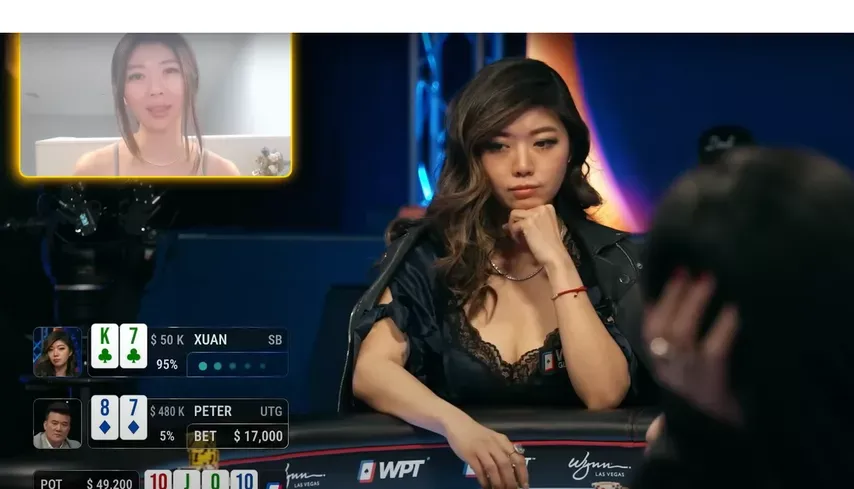
Peter has a great instinct for when he can apply pressure. When the button raises and a player without a token flats from the small blind, it’s a great squeeze spot for him. I’ve seen him do this with 43s. He also has lots of weaker flush draws. So even though I’m not thrilled about it, I think shoving here is the right move. There are just too many hands in his range that I do well against — maybe not crush, but at least flip with.
– What's wrong with check-calling?
– I did consider it, but I didn’t want to see a weird river like a seven or a king that would leave me unsure facing a jam. I didn’t trust myself to play the river perfectly, so I decided to end the hand right there.
I check-raised all-in and he quickly folded. If I knew what he had, I might have preferred to check-call twice, but I’m happy with the result. I suspect he may have folded a hand stronger than mine.
– If he had gone all-in on the turn, how would you have calculated the odds? The math here is quite complicated. How do you take into account the value of the token?
– I would probably have to call here specifically, because there were only two or three players without a token. Given my potential 16 outs, the net equity situation wasn’t that bad. Given the extra EV of the token, a call was probably mandatory.
– Do you think that the players in the game are constantly trying to take into account the changing value of the token? Or does no one bother and everyone just plays?
– Firstly, no one has much time to think. If you constantly slow down the game and are not a VIP, you will not be invited again. You have to rely on intuition. It is often impossible to calculate everything, you have to guess.
– So, the one who will succeed here is the one who has a natural talent for poker?
– Haha! Natural talent for poker can take many forms. But this is definitely one of them. Squid poker is definitely a more challenging and grueling game than regular cash.
– Because all ranges are greatly expanded or because you have to constantly think about additional elements of the overall strategy?
– Yes, mostly because of the metagame. It becomes very difficult to narrow people's ranges. It is almost impossible to play on autopilot. The starting layout constantly changes depending on who has a token, who doesn't, whether we are playing with a progressive squid, and so on. It is not profitable to be distracted – absentmindedness can cost hundreds of dollars in waiting.
– Do you play with the squid all the time? That is, when one round ends, the next one starts right away?
– That's right, yes.
– What do you like about this game? I find the stage when there are two people left without a token very interesting.
– It’s a terribly nervous game, but it can be very profitable. Many people don’t understand how to approach it correctly. And this, by the way, is another variable – you can perfectly know the correct strategy for the squid, but it will be less optimal if you don’t adjust against opponents who don’t know what they should do. I think this is where natural poker talent comes in – in the ability to understand your opponent.
– Do you think that players on average adjust too much or too little to the squid game?
– Too much. People often overestimate the value of the token and chase it too recklessly. It's a good strategy when you always buy a very short stack, but if you spin up a little and don't change the strategy, the dispersion will be just monstrous.
– It seems like short stacking gives a big advantage in this game.
– I agree. With a short stack, you can go all-in wide when you don't have a token, increasing the likelihood of getting one. And a token costs 6-8 bb.
– And if you lose your stack and can't rebuy while the squid round is going on, and you don't have a token, are you considered a loser and have to pay everyone?
– Yes.
– When we started this podcast six years ago, solvers hadn’t developed to the point where they are today. I’ve asked guests what hand they think is the most underrated, and they’ve often said K7s, K6s – hands that we know solvers love! They’re probably no longer underrated today.
When you watch a stream showing pocket cards, do you ever feel ashamed of the tight folds some players make preflop? No need to name names, of course.
– Well, some people adjust too much, some adjust too little. I tend to play tighter in deep stacks because of a lot of bad memories. When you have one of the last two players without a token, it's impossible for him to have a good hand at all, you push him all-in for 400bb with or , and he shows or . I've lost a lot of hands like that. It's bad luck, of course, but also not knowing my opponents well enough. Over time, I've gotten better at understanding who's expanding their ranges and who's not.
– It was a very volatile session for you – you started very badly but ended up big. How much do swings affect your game? Not only in squid, but also in MTTs or regular cash games. Do you have a superpower to ignore bad beats and variance?
– I took a few years off from poker. When I came back, I felt really comfortable for the first year, but then I went through a rough patch, which coincided with moving up in stakes. It definitely put pressure on me mentally. I struggled until I started playing a lot of squid. Squid toughened me up, so to speak. The volatility, the risk, the closer equities given the value of the tokens – it’s a game that’s a bit like Omaha. So when I play regular poker, I really feel like I have this superpower of not being afraid of variance. On the other hand, squid and playing on streams all the time, where there’s a lot of action, has made me more impatient.
– You said that you still regret the hand where you randomized your decision. Can you tell us more about that?
– In a live game, I try never to randomize, because you can always find additional factors that will incline you to one decision or another if you think about it a little. But at that moment, I had some personal problems, I didn’t trust my intuition, so I decided to randomize. It was at the Poker Night in America show, where I played against Phil Hellmuth and Jungleman.
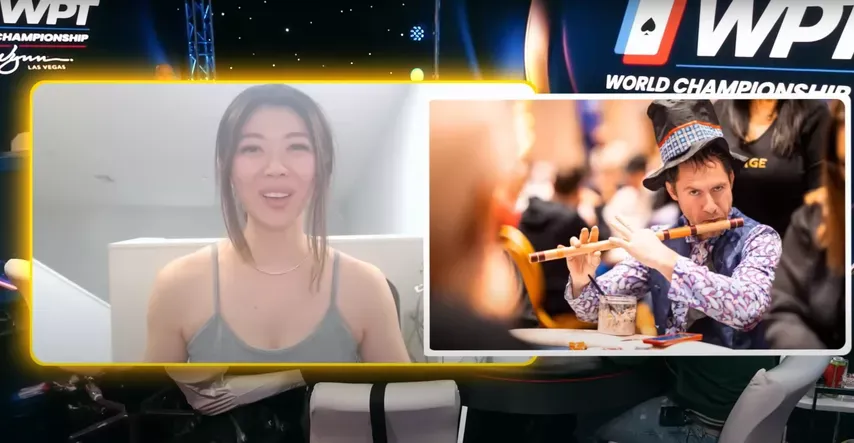
Jungleman, as he usually does, put me in a tough spot by betting two pots on the river. I was confident that I had a hand to call – in theory, that is, against a solver or a player who would find the right bluffs. Against another opponent, I would confidently fold, but against Jungleman, it could be a mistake. I randomized my decision, folded, and he showed a bluff. It was very frustrating. It was worth thinking a little more and trusting myself. Especially when I flipped a coin, got a fold, but my inner voice still demanded that I call...
– Many, on the contrary, highly value playing according to GTO and frequent randomization, but you are not the first person who proves the opposite to me.
– Well, for me, randomization shows results much lower than expected! Once, my partner and I rolled a dice to decide what to do with our relationship. There were four options related to continuation in one form or another, and only two – with a complete break, and one of them came up. We had to break up.
– Are you telling this as an example of bad randomization?
– It's hard to say. I don't want to start a complicated discussion of the metagame of personal relationships here. I'm just telling the story as it interests me.
– Tell me about your quest to play poker in every province in Canada while showing a plus considering expenses. I love such complexly structured long-term projects!
– I was thinking about content creation options at the time. I was burnt out from the regular poker grind, so I came up with this idea and decided to combine it with a bankroll challenge. My task was to move from one province to another, winning enough money to travel. The initial bankroll was $1,000 from the WPT Global room and $1,000 in cash. The quest turned out to be very nerve-wracking and, perhaps, the most difficult of all that I have done in poker. I am incredibly happy that I was able to successfully complete it, and I think I am the only person who has done something similar. In the Arctic, I had to assemble a team myself to play. In one of the provinces, I had a downswing, and I even thought that this would be the end of the trip, but then I won ten buy-ins in one night, and this saved me.
A lot depended on luck, but it also required a strategic approach to choosing places to play, hotels, etc. And combining all this with creating content is not so easy either, especially when you have no experience in video shooting.
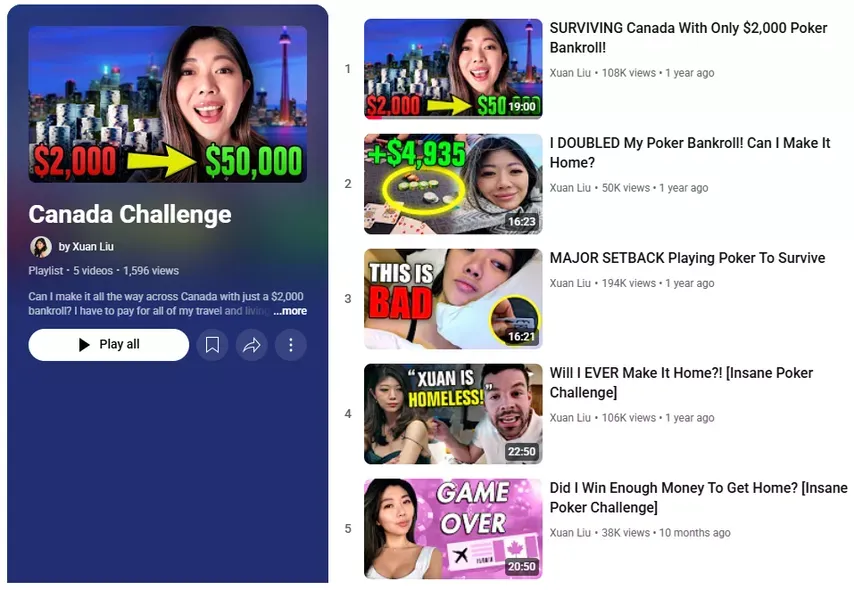
In my opinion, poker is still one of the easiest ways to make low six figures annually. You don’t need formal education. There are tons of resources. In North America, access to games — whether casino or home — is pretty easy. With the right mindset, as my challenge showed, you can go far even starting with a tiny bankroll.











